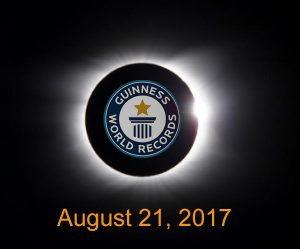Will the total solar eclipse on August 21, 2017 be a record breaker? Could it become the greatest solar eclipse of a generation? There have been predictions already on just how many people will witness the total solar eclipse in the summer of 2017. Looking back at previous eclipses, there really is only one contender to rival the potential popularity of the Great American Eclipse of 2017.
The 1999 Total Solar Eclipse
The most notable recent total solar eclipse that occurred over a heavily populated land mass was the total solar eclipse of August 11, 1999. Noted as the last total solar eclipse of the 20th century and of the millennium, it began in the Atlantic Ocean. The path of totality then swept across Europe, the Middle East and India allowing tens of millions of people easy access to the moon’s shadow for a little over 2 minutes. A number of large cities were positioned within the path of totality such as Munich, Stuttgart and the capital of Romania, Bucharest. Many other densely populated cities including capital cities were located just outside the path of totality such as Paris, Vienna and Budapest. This was undoubtedly the most witnessed total solar eclipse to date. Although not completely clouded out, weather for the event wasn’t too favorable across Western Europe, however things improved the further East observers were located. In Egypt, Muslims shut themselves away on the orders of clerics whereas Jordan and Syria declared a national holiday.
So how many viewed the eclipse?
It’s hard to decipher just how many people actually witnessed totality in 1999 but it’s fairly certain that around 350 million people witnessed the eclipse in one form or another, whether it was a partial eclipse or a clouded out totality plunging observers in to darkness. With the continued growth of the internet and some well planned live news coverage, this was one of the first eclipses to be broadcast and watched live around the world on a mass scale by the media.
How will the 2017 solar eclipse compare to 1999?
It’s hard to compare the two eclipses as they occur on very different demographic and geographical areas. There are some obvious similarities however. Both eclipses occur over a large populated landmass. Both eclipses are easily accessible by transport networks along the majority of the path of totality. Both eclipses occur in August, a preferable month on average for weather conditions in both cases. The 2017 eclipse will last up to a maximum of 2 minutes and 40 seconds compared to 2 minutes and 23 seconds in 1999. One factor that is completely different would be that the 2017 eclipse only occurs over one country compared to the 14 countries that experienced the splendor of totality back in 1999.
Mass movement
There will likely be more people booking long haul flights in order to hunt down the Moon’s shadow in 2017. The USA is a widely accessible and popular country to visit in August. The event has the potential to cause the single largest mass movement of people for peaceful reasons. The 1999 eclipse certainly convinced many people to travel but 2017 could be the trump card for the greatest total solar eclipse of a generation.
Social Media
The new kid in town for the 2017 eclipse compared to 1999 has to be social media. Back in 1999 social media was still in its infancy and was yet to capture the imagination of the world as it does today. Mobile phones were not widely used as they are now and 3G was not invented until 2001. The first iPhone was 8 years away, YouTube was 6 years away, Facebook was a figment of Mark Zuckerberg’s imagination and Google was barely a year old.
The total solar eclipse of 2017 will be witnessed, reported and shared in a completely different way compared to reporting near the turn of the millennium. Countless people will be tweeting, hashtagging, messaging, Facebooking, streaming and FaceTiming their experience. Not forgetting that the birthplace of most of these social media giants was, you guessed it, The United States. All reputable 24-hour news stations will no doubt prepare special live coverage on eclipse day. Will this natural event break the internet? Possibly. (Americaneclipse2017.org excepted of course!)
All of this remains to be seen but the total solar eclipse in 2017 is certain to be one of the greatest of our generation.

